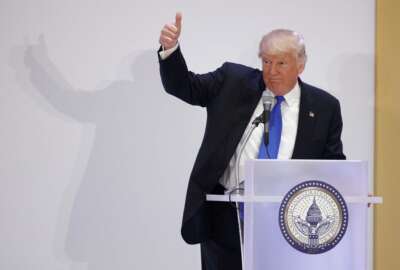
Caretakers serve in key DoD posts while Trump assembles Defense team
Retired Marine Gen. James Mattis is the only member of the Trump administration's Defense team to be nominated, yet alone undergo a confirmation hearing.
Retired Marine Gen. James Mattis is in his fourth full day on the job after the Senate moved quickly on Friday to confirm him as the
new secretary of Defense just hours after President Donald Trump took the oath of office and formally nominated him to the post. But thus far, he’s the only member of the incoming administration’s Defense team to be nominated, yet alone undergo a confirmation hearing.
So for the time being, the remainder of DoD’s senior leadership positions will be filled by caretakers who served in the Obama administration.
Robert Work — who was technically the acting secretary of defense for a few hours Friday before Mattis was confirmed 98-1 — will stay on in his post as deputy secretary until his replacement is nominated and confirmed, at Trump’s request. (Humorous side note: Work, a retired Marine colonel, joked during his retirement ceremony that the real reason was an ancient conspiracy by the Marine Corps to ensure the posts of secretary, deputy secretary and Joint Chiefs chairman were all held by Marines at the same time).
But the President accepted the resignations of the secretaries of each of the military services, along with many of their assistant secretaries and undersecretaries effective Jan. 20, and secretariats of the Army, Navy and Air Force will be temporarily led by lower-level officials who received Senate confirmation in the last administration.
On Monday, the President signaled his intent to nominate Heather Wilson, a former New Mexico congresswoman as secretary of the Air Force, and he announced several weeks ago that Vincent Viola, a billionaire businessman who is also the owner of the Florida Panthers, is his pick to be secretary of the Army, but the Senate Armed Services Committee has yet to schedule a confirmation hearing.
So for now, Robert Speer, the Army’s comptroller and assistant secretary for financial management, will serve as acting secretary of the Army, and Karl Schneider, the service’s deputy chief management officer, will be acting undersecretary.
Lisa Disbrow, who’s been the undersecretary of the Air Force since February 2016, will serve as that service’s acting secretary. Disbrow, who’s served in the Air Force both in and out of uniform since 1985, was previously the service’s comptroller. The position of Air Force undersecretary is vacant for now.
The Navy, meanwhile, will be temporarily led by its longtime acquisition executive, Sean Stackley, who’s been the assistant secretary of the Navy for research, development and acquisition for the past eight years. Thomas Hicks, the deputy undersecretary of the Navy for management, will serve as acting undersecretary, and the Navy’s assistant secretary roles will be filled by their offices’ principal deputies.
The new acting secretaries for the military services are among only about 50 people the Trump administration has asked to stay on and provide continuity. The President, so far, has only chosen 29 people to fill the 690 government posts whose duties require Senate confirmation, according to a tally by the Partnership for Public Service.
Within DoD, other key officials who departed on Friday and have yet to be replaced include the various undersecretary posts in charge of matters such as acquisition, personnel, policy and intelligence and the more than one dozen assistant secretaries who serve within each of those organizations.
But Peter Cook, who until Friday was the Pentagon’s press secretary, said the department was confident there would be no disruption to its mission, noting that none of the military members who make up the Joint Chiefs of Staff are going anywhere, nor are DoD’s career civil servants.
“There is a depth of uniformed experience that will serve this country, will serve the next president and the next administration,” he said. “It certainly adds to the continuity here in the Department of Defense, and we have a significant number of civilians in this building who are just as dedicated, serving their country, very capable, very experienced. And I can assure you they are ready to do that job as they’ve done in the past. We have had seamless transitions in the past in the Department of Defense, and we’re prepared to do the same here.”
Return to the DoD Reporter’s Notebook
Copyright © 2025 Federal News Network. All rights reserved. This website is not intended for users located within the European Economic Area.
Jared Serbu is deputy editor of Federal News Network and reports on the Defense Department’s contracting, legislative, workforce and IT issues.
Follow @jserbuWFED





